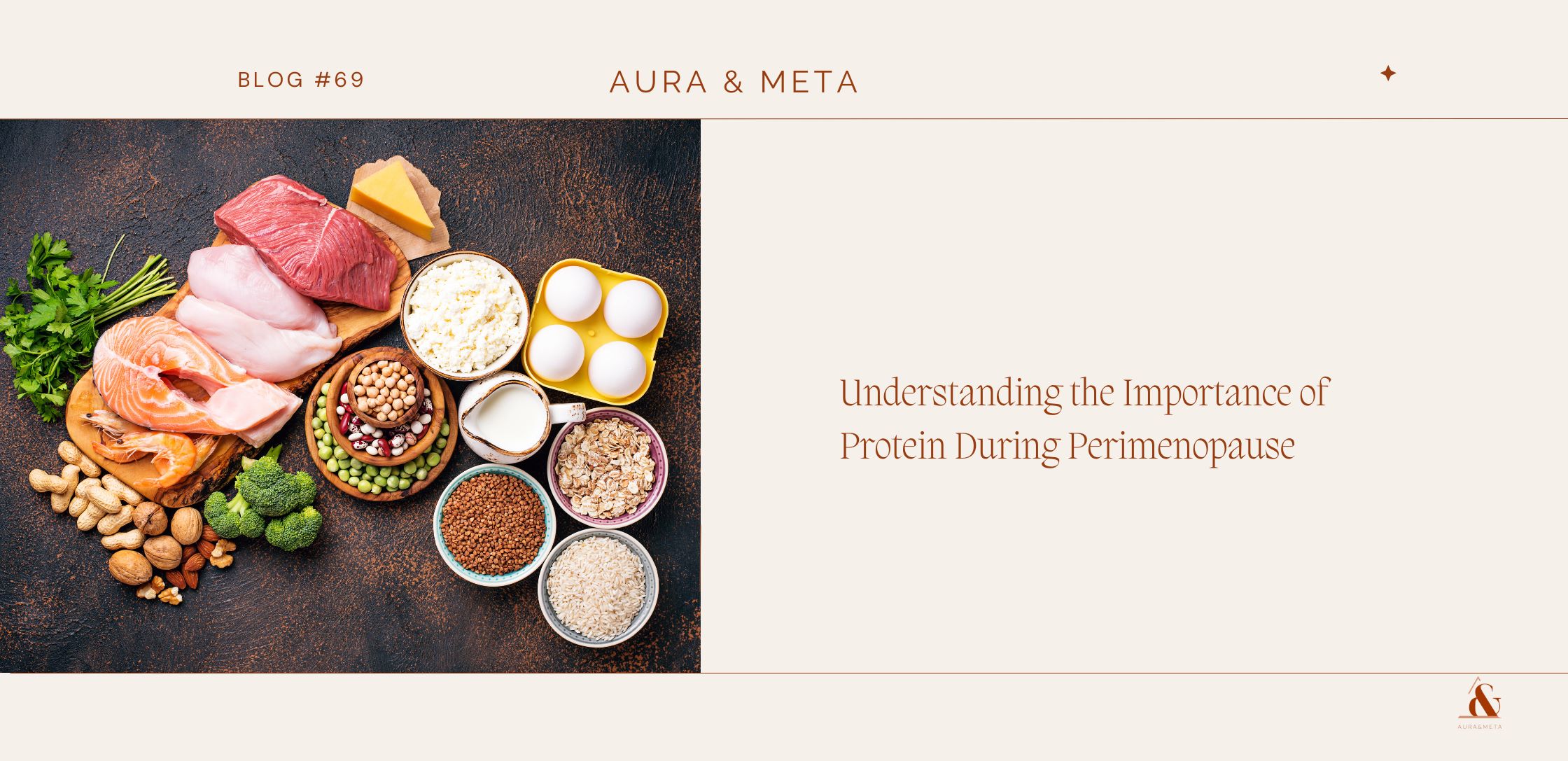As women enter the perimenopausal stage, a new set of health priorities emerges. From managing weight changes and maintaining muscle mass to supporting energy and hormone balance, protein becomes an essential nutrient in daily life. Protein supports vital functions in the body and becomes even more critical during perimenopause to help counter the hormonal changes that often affect metabolism, muscle mass, and overall energy.
At Aura & Meta, we specialize in helping women navigate these transitions with personalized nutritional guidance, including the importance of a high-protein diet.
Why is Protein So Important at Perimenopause?
1. Supporting Lean Muscle Mass and Metabolism
During perimenopause, hormonal shifts, particularly in estrogen, can cause a decrease in muscle mass and a slower metabolism. Protein is essential for muscle repair and growth, which helps maintain a healthy metabolic rate. The higher your muscle mass, the more calories you burn, even at rest, which is crucial for managing weight during this life stage.
For a tailored approach to managing metabolism, explore our nutritional therapy services designed to support your body’s unique needs through perimenopause.
2. Balancing Blood Sugar and Reducing Cravings
Protein plays a significant role in blood sugar regulation. High-protein meals help stabilize blood sugar levels, reducing cravings and the likelihood of experiencing mood swings or energy crashes. These benefits are particularly relevant during perimenopause when women may experience shifts in blood sugar regulation.
If you’ve been experiencing frequent energy slumps or cravings, our functional testing for hormone and metabolic health can help identify imbalances and provide insights into the most effective dietary adjustments.
3. Hormone Production and Balance
Protein provides the building blocks, such as amino acids, needed for hormone production. As estrogen and progesterone levels fluctuate during perimenopause, supporting hormone balance through adequate protein intake can make a noticeable difference in how you feel. Nutrients found in protein-rich foods, like B vitamins, also play a role in managing symptoms such as mood swings and sleep disturbances.
Our Women’s Hormone Testing can help you better understand how to support your hormonal health with tailored dietary and lifestyle choices.
How Much Protein Do You Need?
The recommended protein intake may vary depending on individual factors such as age, weight, and activity level. On average, women over 30 should aim for 20-30 grams of protein per meal to optimize muscle retention and metabolic function. Increasing your protein intake with sources like lean meats, eggs, legumes, tofu, and protein-rich grains can be highly beneficial.
Best Sources of Protein During Perimenopause
- Lean Animal Proteins: Chicken, turkey, and lean cuts of beef or pork offer high-quality protein and essential amino acids.
- Fish and Seafood: Salmon, mackerel, and sardines are protein-packed and high in omega-3 fatty acids, which support inflammation reduction and cardiovascular health.
- Plant-Based Proteins: Lentils, chickpeas, quinoa, and tofu provide sources of proteins for those who prefer plant-based options.
- Dairy and Eggs: Greek yogurt, cottage cheese, and eggs offer easily digestible proteins and are rich in essential nutrients like calcium and vitamin D.
To learn more about how personalized nutrition can benefit you during perimenopause, explore our Nutritional Therapy offerings.
The Role of Protein in Managing Perimenopausal Symptoms
1. Mood Stability and Mental Health
Perimenopause often brings fluctuations in mood due to hormone changes. Protein-rich foods provide amino acids, which are precursors for neurotransmitters like serotonin and dopamine. These “feel-good” chemicals play an essential role in mood regulation and mental well-being. Increasing protein intake can help mitigate mood swings and improve emotional resilience.
2. Energy Levels and Fatigue Management
Feeling drained during perimenopause is common. Protein, which provides a sustained energy source, helps prevent energy dips throughout the day. A balanced diet rich in protein supports mitochondrial function—the part of the cell that generates energy—helping you maintain energy and reduce the feeling of fatigue.
For a comprehensive view of your health, consider exploring our Dutch Test for insight into how hormonal fluctuations may impact your daily energy levels.
A Holistic Approach to Wellness: Integrating Nutrition and Lifestyle
Maintaining high protein intake is essential, but it’s only one piece of the puzzle. At Aura & Meta, we focus on an integrative approach that combines nutritional guidance, personalized testing, and lifestyle strategies to empower women during perimenopause. Our unique blend of kinesiology, nutritional therapy, and functional health testing addresses your needs from multiple angles, creating a balanced plan for wellness.
How Aura & Meta Can Support You Through Perimenopause
If you’re looking for ways to optimize your health and feel your best during perimenopause, our team at Aura & Meta is here to help. With expertise in genetic testing, hormone health, and nutritional therapy, we offer a personalized roadmap to wellness. From optimizing protein intake to improving energy levels, we provide comprehensive support to enhance your health journey.
Are you ready to feel more energized and balanced? Book a consultation with Aura & Meta today to learn how personalized nutritional guidance and a high-protein diet can support you through perimenopause. Empower yourself with the knowledge and resources to embrace this transformative stage with confidence and vitality.

